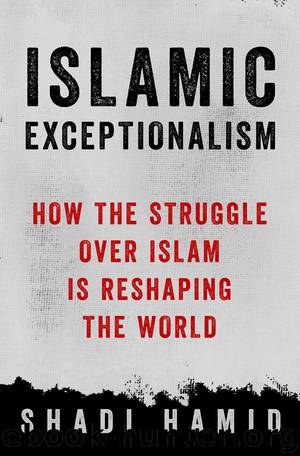Islamic Exceptionalism by Shadi Hamid

Author:Shadi Hamid
Language: eng
Format: epub
ISBN: 9781466866720
Publisher: St. Martin's Press
Learning to Love the State
Needless to say, the Turkish state’s insistence on French-style secularism, or laïcité, rather than the neutrality of the American model of state-church relations, was a constant source of anger and alienation for Islamists. But, then again, so many things about the Turkish state—and its militantly secular bureaucratic arms—angered and alienated. The grievances accumulated, coming to a head in the 1997 coup. But instead of confronting the state head-on, Turkish Islamists opted instead for the long game, whittling away at secular dominance little by little.
Repression is often assumed to have a radicalizing effect on Islamist movements. This is in some ways intuitive—bad behavior produces more of the same. Under certain conditions, however, political exclusion can actually have a moderating effect on Islamist actors. As I have argued elsewhere, a resurgent authoritarianism in Egypt and Jordan pushed the Muslim Brotherhood to deemphasize their Islamism, moderate their rhetoric, and move to the center in a bid to stave off political isolation.15 Strengthening alliances with non-Islamist actors offers a layer of protection against regime repression. After all, it’s more difficult to repress Islamists the more diverse and expansive their support. In Turkey, a similar dynamic was at play, with each party ban forcing Islamists to regroup and rethink. With each new round of repression, the goal was simple enough: avoid getting closed down the next time around.
The 1997 removal of Erbakan was the first of the country’s coups that specifically targeted an Islamist party in power, so it’s no surprise that it had a profound impact on a new generation of Islamists. The so-called “February 28 process”—named after the date of the military’s intervention—went well beyond a change in government, aiming to deal a decisive blow against the broader Islamic movement in every facet of public life, particularly in the educational sphere. The military issued an eighteen-point plan that shut down religious imam hatip schools and extended compulsory primary education—which pushes the state’s secular doctrine—from five to eight years. State institutions were purged of overtly devout officials. Thousands of Islamists faced water cannons and police batons as they protested the closure of imam hatip schools, which were perceived to be breeding grounds for future Islamist enemies of the secular state.16 The extent of the assault on Islamic networks was unprecedented. They would learn their lesson. As careful as they already had been, they would need to be even more cautious, steering well clear of any perceived red lines, lest the regime’s sword of Damocles fall once again.
After the Welfare Party’s successor, the Virtue Party, was also banned, Erdogan, Abdullah Gul, and their group of upstarts parted ways with Erbakan and founded a new party that defined itself not as Islamic but as “conservative democratic.” After a landslide victory in the 2002 elections, Turkey’s economic transformation began in earnest. AKP leaders pledged their fealty to Ataturk’s memory (which must have been difficult for them) and presented themselves as faithful proponents of the republic’s secular principles. They highlighted their relative youth, juxtaposed against Erbakan’s unusually long political career spanning four decades.
Download
This site does not store any files on its server. We only index and link to content provided by other sites. Please contact the content providers to delete copyright contents if any and email us, we'll remove relevant links or contents immediately.
| Arms Control | Diplomacy |
| Security | Trades & Tariffs |
| Treaties | African |
| Asian | Australian & Oceanian |
| Canadian | Caribbean & Latin American |
| European | Middle Eastern |
| Russian & Former Soviet Union |
The Secret History by Donna Tartt(19088)
The Social Justice Warrior Handbook by Lisa De Pasquale(12190)
Thirteen Reasons Why by Jay Asher(8909)
This Is How You Lose Her by Junot Diaz(6886)
Weapons of Math Destruction by Cathy O'Neil(6279)
Zero to One by Peter Thiel(5802)
Beartown by Fredrik Backman(5754)
The Myth of the Strong Leader by Archie Brown(5507)
The Fire Next Time by James Baldwin(5444)
How Democracies Die by Steven Levitsky & Daniel Ziblatt(5218)
Promise Me, Dad by Joe Biden(5153)
Stone's Rules by Roger Stone(5088)
A Higher Loyalty: Truth, Lies, and Leadership by James Comey(4963)
100 Deadly Skills by Clint Emerson(4925)
Rise and Kill First by Ronen Bergman(4788)
Secrecy World by Jake Bernstein(4753)
The David Icke Guide to the Global Conspiracy (and how to end it) by David Icke(4718)
The Farm by Tom Rob Smith(4509)
The Doomsday Machine by Daniel Ellsberg(4490)
